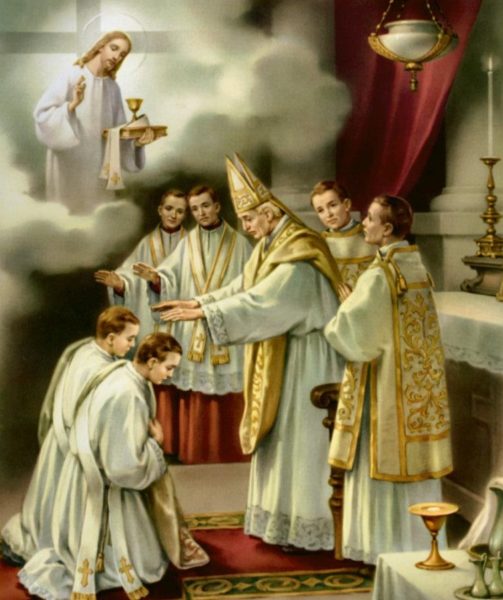Holy Orders
“I remind you to rekindle the gift of God that is within you through the laying on of my hands” (2 Timothy 1:6).
The whole Church is a priestly people. Through Baptism all the faithful share in the priesthood of Christ. This participation is called “the common priesthood.” There exists also another participation in the mission of Christ – the ministry of Holy Orders, where the task is to serve in the name and in the person of Christ the Head in the midst of the community.
The ministerial priesthood differs from the common priesthood because it confers a sacred power for the service of the faithful. The ordained ministers exercise their service for the People of God by teaching (munus docendi), divine worship (munus liturgicum) and pastoral governance (munus regendi).
Since the beginning, the ordained ministry has been conferred and exercised in three degrees: that of bishops, that of presbyters, and that of deacons. The ministries conferred by ordination are irreplaceable for the organic structure of the Church: without the bishop, presbyters, and deacons, one cannot speak of the Church.
The bishop receives the fullness of the sacrament of Holy Orders, which integrates him into the episcopal college and makes him the visible head of the particular Church entrusted to him. As successors of the apostles and members of the college, the bishops share in the apostolic responsibility and mission of the whole Church under the authority of the Pope, successor of St. Peter.

Priests are united with the bishops in dignity and at the same time depend on them in the exercise of their pastoral functions. They receive from the bishop the charge of a parish community.
Deacons are ministers ordained for tasks of service of the Church; they do not receive the ministerial priesthood, but ordination confers on them important functions in the ministry of the word, divine worship, pastoral governance, and the service of charity, tasks which they must carry out under the pastoral authority of their bishop.
The sacrament of Holy Orders is conferred by the laying on of hands followed by a solemn prayer of consecration asking God to grant the ordinand the graces of the Holy Spirit required for his ministry. Ordination imprints an indelible sacramental character. The Church confers the sacrament of Holy Orders only on baptized men (viri), whose suitability for the exercise of the ministry has been duly recognized. Church authority alone has the responsibility and right to call someone to receive the sacrament of Holy Orders.
If you are interested in learning more about the priesthood:
Contact Fr. Andrew Merrick, Diocesan Director of Vocations for the Diocese of Baton Rouge, at 225.387.0561.
If you are interested in learning more about the permanent diaconate:
Contact Fr. Jamin David, Director of Formation for the Permanent Diaconate, at 225.567.3573.
Vocations Committee
Promoting vocations to the priesthood and religious is an obligation of all Catholics and something that requires an ongoing awareness to those God may be calling to these special vocations. The St. Margaret Vocations Committee is a specific tool that the faithful at St. Margaret can be part of to help promote vocations. This group plans events such as the Adopt-a-Seminarian Program during Advent; they also identify promotional materials while encouraging potential, new vocations.
To participate in our Vocations Committee, contact Mary Herbert, ministry chairperson, at 225.567.3573.